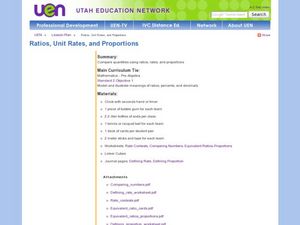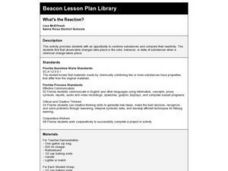Curated OER
Bringing The Greenhouse Effect Down To Earth (CO2 experiment)
Students compare 4 different form of carbon dioxide and discuss the role that carbon dioxide has in the Greenhouse Effect. They then understand that the Greenhouse Effect is a naturally occurring event.
Curated OER
Comparing Properties of Elements & Compounds
In this elements and compounds worksheet, learners review the physical properties of different compounds and elements using websites for information. This worksheet has 1 graphic organizer and 1 short answer question.
Curated OER
Ratios, Unit Rates, and Proportions
Explore the concept of ratios, unit rates, and proportions. Learners convert fractions and percents to decimals. They discuss rates and where they can be found in the real world. A hands-on experiment and numerous flash cards and...
HealthTeacher
Get More Sleep
Help learners identify habits that interfere with sleep and to understand the importance of adequate rest and its impact on not only physical health, but also emotional wellbeing.
Curated OER
Conservation of Mass
In this conservation of mass instructional activity, students experiment with vinegar, baking soda, a balloon and a flask. They compare the mass of the closed system of reactants before the experiment to the mass of the products after...
Curated OER
Indicators For Acids and Bases
Fourth graders compare the color of cabbage water when acids and bases are mixed in. In this acids and bases lesson plan, 4th graders use cabbage water and mix in acids and bases that the teacher prepares before hand. They observe the...
Curated OER
What's the Reaction?
Students combine baking soda and vinegar and observe the chemical and physical changes that this mixture can produce.
Curated OER
Sampling Carbon Dioxide
Students perform an experiment to determine which source of gas (their breath, exhaust from a car, or the air in the classroom) has a greater concentration of carbon dioxide. Students compare the colors of BTB solutions after...
Curated OER
TORNADOES!
Third graders compare the parts of a real tornado with the parts of a tornado created in a demonstration, label "Tornado Alley" on their maps, and label the locations of famous tornado disasters on their maps.
Curated OER
Effect of pH on the Organisms of Tule Ponds At Tyson Lagoon
In this aquatic organism worksheet, students measure the pH of household solutions and of pond water samples. They compare these to tolerance charts for aquatic macro-invertebrates to complete 5 charts or short answer questions.
Curated OER
Nutrients by the Numbers
Students read and discuss an article on the amount of sugar in various food products. They compare the nutritional values of food products, calculate their daily intake of nutrients, analyze serving sizes, and compare/contrast their own...
Curated OER
Photosynthesis: A Controlled Experiment
Learners investigate the amount of starch in a plant under 3 different conditions. In this photosynthesis lesson plan, students compare the amount of starch in a plant with increased carbon dioxide conditions, a plant with decreased...
Curated OER
Wiggley Worms
Students investigate how worms affect plant growth. In this biology lesson plan, students construct a worm ecosystem in a plastic 2 liter bottle and plant a seed in the soil. They later compare the ecosystems with worms to...
Curated OER
Up, Up and Away
Fourth graders design and launch rockets. In this rocket lesson, 4th graders observe the changes in outcome caused by size and fuel variables. Students navigate the NASA website to learn the parts of a rocket. Students load the...
Curated OER
The Solar System
Third graders investigate Newton's law of Motion. In this chemical reaction instructional activity, 3rd graders participate in an experiment with rockets to study Newton's law. Students observe the effects of a chemical reaction...
Curated OER
DNA Extraction Lab
Learners extract DNA and test for its presence from unroasted (raw) wheat germ using a prescribed procedure. They modify the procedure to provide a less expensive, easier method. They also extract DNA from different available plant,...
Curated OER
Fizzy Pop
Fifth graders compare and identify variables that affect the rate of a chemical change using Alka-Seltzer, water, ice, and hot water. They time how long each variable takes to pop the canister into the air, and record the results on a...
Curated OER
Relationships and Biodiversity Lab
In this relationships and biodiversity activity, high schoolers investigate the relationships between 4 plants sample using 7 different tests. These include looking at structural characteristics of the plants, seeds and stems, using...
Curated OER
Working It Out
Students participate in a simulation in which they are arbitrarily assigned different work roles and compare their experiences to those discussed in a New York Times article about the racial divisions in a pork production plant.
Curated OER
What's the Fizz Factor
Learners as a class create a fountain using both coke soda, and mentos candy. In this science lesson, students test which combination of coke and mentos products produce the tallest fountain. Learners use the scientific method to track...
Curated OER
How Much Water?
Young scholars investigate amount of water available in different countries around the world, compare it to their daily water use, and explore how unequal distribution of water can cause challenges to survival. Students then discuss...
Curated OER
States of Matter
Fourth graders define the term matter. They compare properties of solids, liquids, and gases. They describe how matter changes from one state to another. They classify objects as either solid, liquid, or gas.
Curated OER
Introduction to Gases
Students are introduced to gases. In this science lesson plan, students demonstrate that gases are a state of matter, generate a number of gases, discover some properties of gases, compare some of the properties of different gases, and...
Curated OER
Density Demonstration: Coke vs. Diet Coke
For this density demonstration, students compare a can of diet coke to a can of regular coke. They list the similarities and differences of each prior to the demonstration. The cans are placed in a tank of water and students record their...

























